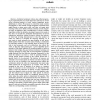Free Online Productivity Tools
i2Speak
i2Symbol
i2OCR
iTex2Img
iWeb2Print
iWeb2Shot
i2Type
iPdf2Split
iPdf2Merge
i2Bopomofo
i2Arabic
i2Style
i2Image
i2PDF
iLatex2Rtf
Sci2ools
126
click to vote
CORR
2010
Springer
2010
Springer
Imitation learning of motor primitives and language bootstrapping in robots
Abstract— Imitation learning in robots, also called programing by demonstration, has made important advances in recent years, allowing humans to teach context dependant motor skills/tasks to robots. We propose to extend the usual contexts investigated to also include acoustic linguistic expressions that might denote a given motor skill, and thus we target joint learning of the motor skills and their potential acoustic linguistic name. In addition to this, a modification of a class of existing algorithms within the imitation learning framework is made so that they can handle the unlabeled demonstration of several tasks/motor primitives without having to inform the imitator of what task is being demonstrated or what the number of tasks are, which is a necessity for language learning, i.e; if one wants to teach naturally an open number of new motor skills together with their acoustic names. Finally, a mechanism for detecting whether or not linguistic input is relevant to the task is al...
Related Content
| Added | 24 Jan 2011 |
| Updated | 24 Jan 2011 |
| Type | Journal |
| Year | 2010 |
| Where | CORR |
| Authors | Thomas Cederborg, Pierre-Yves Oudeyer |
Comments (0)

